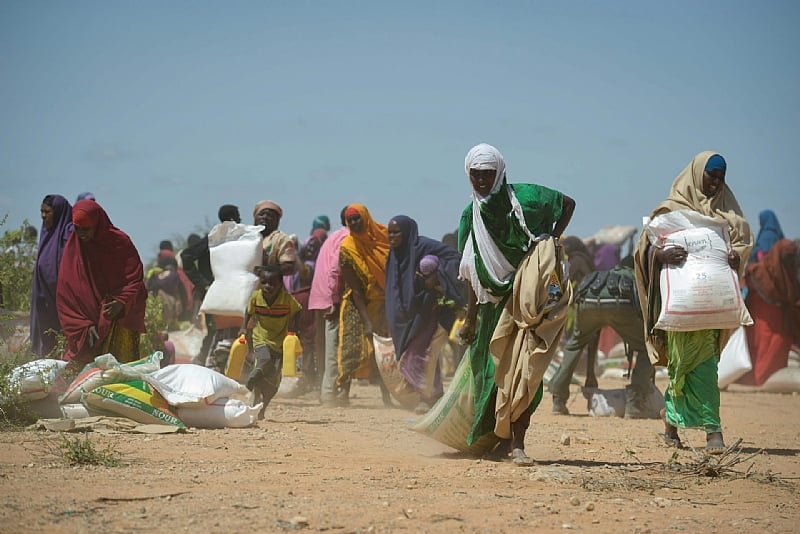Over the last decade, there has been growing international focus on the role of food in conflict, particularly in Africa. The continent has seen an increase in jihadist terrorism in several regions.
Violence, like that exercised by terrorist organisations, is linked with food security conditions, causing a vicious circle of hunger and conflict.
Terrorism generates food disruptions. It undermines production systems and supply routes.
At the same time, growing food shortages intensify tensions and competition over essential resources at the margins of vulnerable societies. This increases the risk of mobilisation into violence.
We are researchers in international security and contemporary warfare. In a recent article, we explored the role of food in Africa’s terrorist insurgencies. We focused on Boko Haram in Nigeria and Al-Shabaab in Somalia.
We show how food is not only a driver or victim of violence. It is also central to how terrorist groups fight, govern and survive.
Terrorists use food as a tool to challenge national authorities and increase their followers. In parallel, they exploit food insecurity to control communities and confront counter-terrorism forces, pushing the state out of contested areas.
This has major implications. The use of food as a weapon worsens humanitarian conditions. It causes the displacement of people in vulnerable settings. As a result, it sets in motion dangerous mechanisms of instability that can even undermine militants themselves, reducing their resources and operational capabilities.
State responses need to address these challenges and promote more comprehensive approaches to counter terrorism.
Weaponising supplies
Since the late 2000s, Boko Haram and Al-Shabaab have engaged African security forces in a strenuous fight. Both groups have sought to overthrow local governments and establish their power.
They have expanded their networks in regions where food security is low. These are Nigeria’s Borno State and southern Somalia.
These areas have witnessed historical frictions between the population and government authorities. Local communities have lamented socioeconomic marginalisation, shortages of essential resources and high levels of unemployment.
Both Boko Haram and Al-Shabaab have sought to capitalise on inequalities to gain appeal among aggrieved populations, seeking to replace the state in the delivery of essential resources.
Boko Haram militants have reportedly provided supplies, such as biscuits, rice and spaghetti, to marginalised villages. As a Borno State resident put it, the militants have shown “love and concern” while addressing local needs.
Al-Shabaab has resorted to similar practices to win the hearts and minds of southern Somalis and enlarge its pool of recruits. The group has supplied struggling communities with meals and goods, and promoted local agricultural activities.
In parallel to these activities, both terrorist groups have adopted more aggressive measures to counter the advance of anti-terrorism forces. They have used food denial to punish civilian insubordination and cooperation with the state, relying on starvation tactics.
Boko Haram has systematically targeted food infrastructures. The group has burned crops, banned farming and fishing activities, and even poisoned water sources. This has happened particularly in places where militants suspected collusion between communities and national authorities.
Likewise, Al-Shabaab has interrupted trade routes. It has destroyed food imports to isolate southern Somali villages controlled by security forces and deprive them of popular support. During Somalia’s 2011–2012 famine, Al-Shabaab militants blocked humanitarian agencies. This was aimed at preventing the distribution of food aid to curb western influence in territories under their control.
The repercussions
The use of food as a weapon has had major repercussions in Borno State and southern Somalia. It is a primary cause of the deterioration of food security in these regions over the last 15 years.
Attacks on food resources and infrastructure have disrupted supply routes. They have pushed people to abandon their crops and pastures. This has decreased the production and availability of essential goods.
As a result, humanitarian conditions have worsened, local economies have weakened and displacement flows have intensified.
This has had detrimental effects for Boko Haram and Al-Shabaab, depriving militants of key assets to sustain their activities and attract new recruits.
The two terrorist groups have become victims of the emergencies they have helped generate. They have increasingly struggled to supply nourishment for their troops and supporters. Consequently, they have witnessed a growing number of defections motivated by unsustainable conditions.
Reports highlight increasing cases of jihadists surrendering to security forces while requesting food.
To address these challenges, Boko Haram and Al-Shabaab have intensified raids on villages, looting goods and livestock.
However, growing frictions with the population have undermined the groups’ operational capabilities, even opening up new fronts of resistance.
Boko Haram has been forced to transfer part of its resources and operations to the Lake Chad area. The group has intensified incursions to capture food in Nigeria’s neighbouring countries.
In Somalia, tensions with farming and pastoralist communities have led to the creation of militias mobilising against Al-Shabaab.
What next
The relocation of Boko Haram’s operations and the mobilisation of communities against Al-Shabaab have not eradicated the terrorist threat. However, these events further highlight food as a crucial factor shaping insurgencies.
African and international authorities need to tackle the dynamics of food weaponisation. They need to refine their approach to enhance local resilience, addressing the inequalities that insurgents exploit.
The authors do not work for, consult, own shares in or receive funding from any company or organisation that would benefit from this article, and have disclosed no relevant affiliations beyond their academic appointment.
By Simone Papale, Postdoctoral Research Fellow, University of Parma And
Emanuele Castelli, Associate Professor of Political Science , University of Parma


